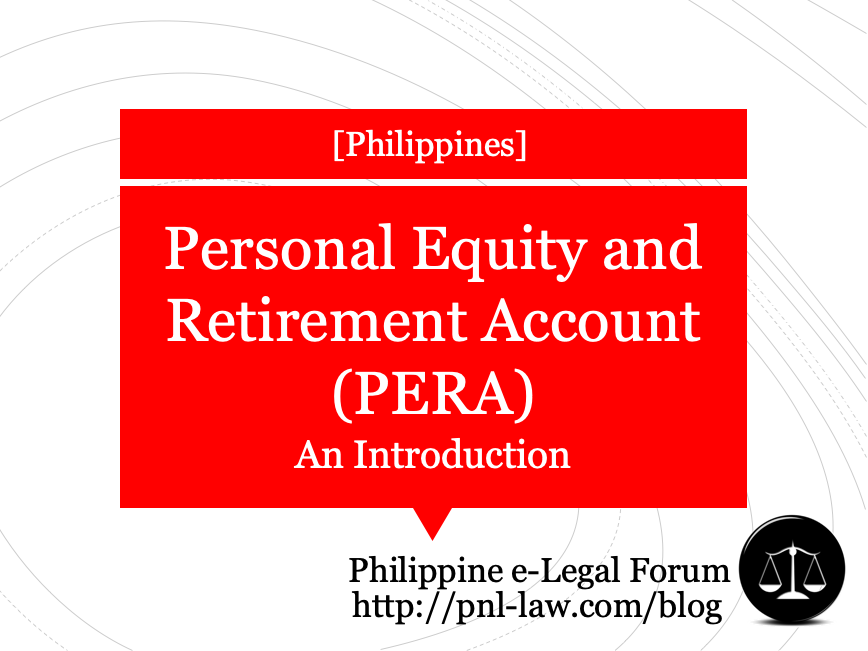PERA stands for “Personal Equity and Retirement Account,” which refers to the voluntary retirement account established by and for the exclusive use and benefit of the Contributor for the purpose of being invested solely in PERA investment products in the Philippines. The Contributor shall retain the ownership, whether legal or beneficial, of funds placed therein, including all earnings of such funds. He makes all investment decisions pertaining to his PERA, with an option to appoint an Investment Manager.

A Contributor may create and maintain a maximum of five (5) PERA, at any one time, provided that the Contributor shall designate and maintain only one Administrator for all his PERA.
It is governed by Republic Act 9505, also known as the “Personal Equity and Retirement Account (PERA) Act of 2008 ”, which was approved on 22 August 2008.
Who is a “Contributor”?
A “Contributor” is any person with the capacity to contract and possesses a tax identification number. The Contributor establishes and makes contributions to a PERA.
How much is the maximum annual PERA contribution?
Subject to subsequent adjustment by the Secretary of Finance, the aggregate maximum contribution is P100,000, or its equivalent in any convertible foreign currency at the prevailing rate at the time of the actual contribution, for each Contributor per year.
If the Contributor is married, each spouse may make a maximum contribution of P100,000.
If the Contributor is an Overseas Filipino, the maximum contribution is double the allowable maximum amount. “Overseas Filipino” refers to (1) an individual citizen of the Philippines who is working or deriving income from abroad, including one who retained or reacquired his Philippine citizenship under Republic Act 9225 , otherwise known as the “Citizenship Retention and Reacquisition Act of 2003 ”; or (2) the legitimate spouse, whether or not said spouse is of Filipino ancestry, and the children of the Filipino citizen mentioned in item (1).
While a Contributor has the option to contribute more than the maximum amount prescribed, the excess shall no longer be entitled to a 5% tax credit.
What is the benefit to employers if they contribute?
If a private employer decides to contribute to its employee’s PERA, the amount shall be allowed as a deduction from the employer’s gross income. However, the employer must also comply with the mandatory SSS contribution and retirement pay.
What is the tax treatment of funds related to the PERA?
- With respect to the Contributions: The Contributor shall be given an income tax credit equivalent to 5% of the total PERA contribution, but there could be no refund of the said tax credit arising from the PERA contributions. If the Contributor is an overseas Filipino, he shall be entitled to claim tax credit from any tax payable to the national government under the National Internal Revenue Code.
- With respect to all income earned from the investments and reinvestments of the maximum amount allowed: Tax exempt.
- With respect to Distributions: All distributions upon retirement/death are tax exempt.
What are Distributions upon retirement/death?
- Distributions, whether in lump sum or through pension at the option of the Contributor, may be made upon reaching the age of 55 years, provided that the Contributor has made contributions to the PERA for at least 5 years. The Contributor, however, has the option to continue the PERA.
- Complete distribution shall be made upon the death of the Contributor, irrespective of the age of the Contributor at the time of his death.
What happens in case of abuse of the tax and privileges?
Any person who unduly avails of the tax exemption privileges granted, possibly by co-mingling PERA accounts in an investment with other investments, when such person is not entitled hereto, shall be subject to: (a) penalties (fine and/or imprisonment); and (b) refund to the government double the amount of the tax exemptions and privileges enjoyed, plus interest of 12% per year from the date of enjoyment of the tax exemptions and privileges to the date of actual payment.
What is the penalty on early withdrawal?
“Early withdrawal” pertains to any withdrawal prior to Distributions upon retirement/death. Any early withdrawal shall be subject to a penalty to be determined by the Secretary of Finance and payable to the government. However, no penalty is imposed for:
- (a) Payment of accident or illness-related hospitalization in excess of thirty (30) days; and
- (b) Payment to a Contributor who has been subsequently rendered permanently totally disabled as defined under the Employees Compensation Law, Social Security Law and Government Service Insurance System Law.
Any premature termination shall be treated as an early withdrawal, except if the entire proceeds are immediately transferred to another PERA investment and/or another Administrator.

well, there are really lots of opportunities in the Philippines for the retirees, since the economy is now growing, lots of investments are available and surely be productive… i found some articles on the website http://www.bnac.com.ph and i think those could be helpful for the retirees… it is somehow related to this article, some concerns regarding retirement in the Philippines…Retirees must be really comfortable.